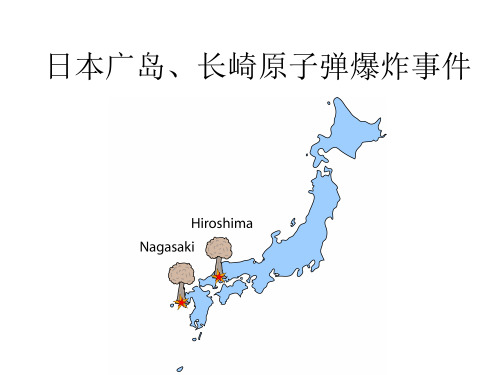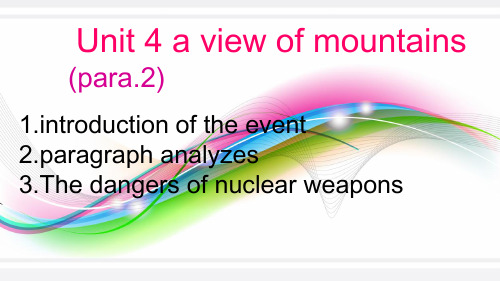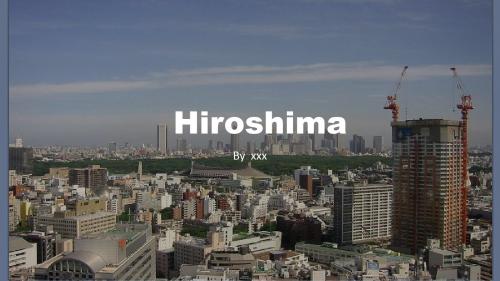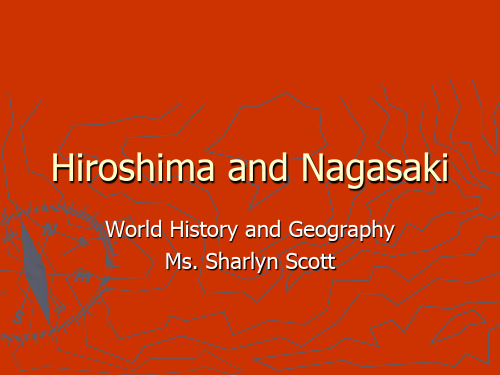英文 二战广岛长崎原子弹事件
- 格式:ppt
- 大小:3.55 MB
- 文档页数:16

1.Based on the cruel Japanese war of aggression in China, south Asia and the attack on Pearl Harbor, do the Japanese deserve this fate?It is hard to answer this question without firstly defining in this circumstance who we defined as “Japanese” for this question.From the microscopic view, the Emperor of Japan and the General (“Shogun”), the Commander in the war are Japanese, but there are also many common citizens in Japan. Based on the regime of Japan, the decision for Japanese aggression in other countries was directly made from both the emperor and the commander. Soldiers had no choice but to obey it. They were trained to kill people, believing that this is the best way for people in other country to liberate themselves. War fanatics used citizens to achieve their ambition to conquer the world. Thousands of Japanese Soldiers was sacrificed in the wars, although we can’t say that they are all innocent, but they are also victims of war too. The citizens and most of the soldiers don't deserve these two bombs.From the macroscopic view, it is Japan who started the Second World War, invaded other countries and tortured the people there. The American detonated two atomic bombs in Japan to end the war as quickly as possible, with the cost of more than 200,000 Japanese dying in the bombing. This avoid the need for a ground invasion of Japan, which would likely to result in even more military and civilians deaths for both side in the conflict. We can’t estimate how many people (regardless of people from other countries) would still die if the war had continue. Therefore, the question here becomes a question regarding the ethics of the war: Can we justify the use of violence to prevent more violence? If the sacrifice of 20,000 people can save millions of people’s life, would it be worthwhile to do this? Furthermore, it is the fact that Japan did launch the war for its own sake, therefore in this context, the rest of the countries who were invaded by Japan (China, south Asia and USA were treated as enemies of Japan. In this case, Japan deserved to be bombed because they attacked others first. It is not a question about morality, but more about winning and losing, and about defending the thousands of lives in our countries. Although it is sad to see that thousand of Japanese lost their families, parents, children and friends in the war, this is the same could be said for other countries, where millions of people died (1700 Mio.) because of the Japanese invasion.2. Based on the Japanese history, is it reasonable for them to start and participate in the Second World War?Yes. 1) Lack of resource.Japan is as large as Germany with a population of about 64.5 million people up till the 1930s. However, about 73 percent of Japan is forested and mountainous, which made the land unsuitable for agricultural, industrial, or residential use. It is also a country with more than 1000 times earthquakes every year and based in a highly volcanic region, with threats from volcanoes as well as typhoon. They have a huge demand of resources from outside world. 2) Culture difference. Though Japanese and Chinese share almost the same characters in the written language, the pronunciations and meaning of the words differ from each other orally. To some degree, Vietnamese, Indonesians, Malaysian and Singaporean may agree that parts of their cultures are derived from Chinese culture. However, Japanese do agree that Chinese culture has an impact ontheir own culture, but they also believe that their culture is greater, unique and more special. That is also the reason why they want to establish “Greater East Asia Co-Pros perity Sphere”, so that their culture can dominate this region of Asia. Due to this reason, the Japanese didn’t felt that they are killing their brothers in the war, but to conquer these area, spread their best culture and offer the native people a better life (if they could still survive). 3) Samurai & ぶしどう(“武士道”). In the 13th century, Hōjō Shigetoki (1198–1261 AD) wrote: "When one is serving officially or in the master's court, he should not think of a hundred or a thousand people, but should consider only the importance of the master."Samurai emphases the duty and absolute loyalty until death from the warrior to their master. This belief remained rooted in most of the Japanese, which may mean that the soldier in the war would kill people cruelly and blindly without knowing whether it is right or wrong to do this. They only obey the order from their commander. By fighting in the war until the last minutes of their life, they believes that they are fighting for their country, their people and their maste r. “Kamikaze” forces may be a very good example to understand this belief, sacrificing their own lives to attack the Allied naval vessels in the war for the greater good of their country.3. Do we over condemn or properly understand the past of Japan?Firstly, what we actually condemn nowadays is not regarding Japan past, but in fact the present. That said, most of us don't over condemn Japan. Though as a Chinese, I feel hurt every time when I heard about the Nanking Massacre, but this is war. In war the stakes are high. As Robert E. Lee said, "it is good that war is so horrible, or we might grow to like it." What I can’t accept is that, nowadays the Japanese Government whitewashes its wartime atrocities by manipulating its history textbooks. Furthermore, there is also a series of behaviors of denying war crime from the Japanese Government, such as making official visits to the Yasukuni Shrine, which listed the name of thousands of war criminals. I can’t imagine what the people of Europe would react if the Ger man prime minister Mrs. Angela Merkel visits the place where the war criminals are enshrined and worship them. Actually, such a “noble” place doesn't and could not exist in Germany. People, whose parents or grandparents were killed or raped by the Japanese, may strongly condemn the crime of Japanese. However, we don't have the right to judge whether they have over condemned the Japanese, since they are the direct victims of the war and we do not have firsthand experience of their suffering. Still, there are some people who take the historical fact as an excuse to boycott and resist everything related to Japan, burning Japanese cars or smashing Japanese restaurants. I think those activities are not sensible at all. Should the descendant of a criminal be treated as a criminal too? If this is the case, then everyone would be guilty of their ancestors’ wrongdoing. It becomes a great barrier for the better understanding between the two countries. We can’t understand the past of Japan properly if we don't know the culture and characteristic of Japan well. But what everyone could do is to make judgment without prejudice. Empathy is an important intercultural competence nowadays.As Chinese we don't expect any compensation from Japan, what we expect is that they can remember the history and learn from it. Just as the retired United States Air Force Charles W. Sweeney once said, “One can only forgive by remembering. And to forget, is to risk repeating history.”。


以广岛原子弹爆炸为主题,写一篇不超过130字的英文文章In the final stage of World War II, the United States carried out two atomic bomb explosions on Hiroshima and Nagasaki in Japan. After six months of intense strategic bombardment of Japanese cities, the Japanese government ignored the Potsdam, the executive order of US President Harry S Truman In August 1, the "little boy" dropped a nuclear weapon in Hiroshima City, and then "fat man" exploded over Nagasaki in August. These are the only targets to use nuclear weapons, because Hiroshima is a city of considerable military significance, including Japan's second army headquarters, Hiroshima County Health Department estimated that in the first two to four months of the explosion, The blast killed people in Hiroshima and Nagasaki, about half of the deaths on the first day.According to Hiroshima Prefecture health agency estimates, in the next few months, the explosion died of flash or flame burns, falling debris and other causes, and a large number of people died of burns, radiation sickness and other injuries, plus disease - a reasonable estimate of all the direct and short-term causes of death - died of radiation sickness - thetenth day after the explosion in Nagasaki, Japan announced its surrender to its allies The Treaty of surrender was signed in September, officially ending the Pacific War. Therefore, Germany in the Second World War signed the surrender in May, ending the European war. To a certain extent, the explosion led to Japan's adoption of the three non nuclear principles after the war to prohibit the state from possessing nuclear weapons.The role of the bombings in Japan, surrender and the ethical reasons why the US defended them, as well as their strategic importance, remain controversial.。



原子弹用英语怎么说原子弹是核武器之一,是利用核反应的光热辐射、冲击波和感生放射性造成杀伤和破坏作用,以及造成大面积放射性污染,阻止对方军事行动以达到战略目的的大杀伤力武器。
那么你知道原子弹用英语怎么说吗?下面来学习一下吧。
原子弹的英语说法1:Atomic bomb原子弹的英语说法2:atom bomb原子弹的相关短语:原子弹轰炸机 a-bomber;原子弹活存者 atom-bomb survivor;原子弹狂 atom mania原子弹的英语例句:1. Scientists transmuted matter into pure energy and exploded the first atomic bomb.科学家将物质转化为纯粹的能量,引爆了第一颗原子弹。
2. At that stage, China did not yet have A - bomb.那个时期中国还没有原子弹.3. The first explosion of the atomic bomb prophesied of change and a new age.原子弹的首次爆炸预示着变化和一个新时代的来临.4. The V2 was not an ordinary weapon: it could only be used against cities. Likewise the atom bomb.V2火箭并非普通武器:它只能用于对付城市。
原子弹也是这样。
5. An atom bomb would destroy a city.一颗原子弹能摧毁一座城市。
6. Only the President could authorize the use of the atomic bomb.只有总统才能授权使用原子弹。
7. At dawn on July 16, 1945, the atomic bomb was set off.1945年7月16日拂晓, 这枚原子弹被引爆.8. On Aug. 6,1945 , a nuclear bomb was dropped on Hiroshima, Japan.1945年8月6日, 一颗原子弹投在日本的广岛.9. The atomic bomb is the offspring of twentieth century physics.原子弹是二十世纪物理学的产物.10. The explosion of atom bombs gives out a good heat.原子弹爆炸产生很大热量.11. The atomic bomb is characterized by the grave injuries caused by radioactivity.原子弹具有由辐射引起严重损伤的特点.12. He didn't know that the atom bomb would work.他不知道原子弹能解决问题.13. The mushroom cloud of the A - bomb hung over the desert again.原子弹爆炸的蘑菇云再度笼罩在沙漠的上空.14. They would also like to demolish the atomic museum.他们甚至还要毁掉原子弹纪念馆.15. The same ideas of critical size and critical mass apply to bombs.同样的临界尺寸概念和临界质量概念适用于原子弹.。
关于广岛原子弹的英语作文The atomic bomb dropped on Hiroshima was a devastating event that changed the course of history. The impact of the bomb was catastrophic, causing widespread destruction and loss of life.The aftermath of the bomb was horrifying, with many people suffering from severe burns and radiation sickness. The city was left in ruins, with buildings reduced torubble and the landscape transformed into a wasteland.The long-term effects of the bomb were also significant, as many survivors suffered from health issues related to radiation exposure. The psychological trauma of the event also had a lasting impact on the people of Hiroshima, as they struggled to come to terms with the horrors they had experienced.Despite the tragedy, the people of Hiroshima showed incredible resilience and strength in the face of adversity.They worked tirelessly to rebuild their city and create a lasting memorial to honor the victims of the bomb.The bombing of Hiroshima serves as a stark reminder of the devastating power of nuclear weapons and the importance of working towards a world free of such destructive capabilities. It is a tragic event that should never be forgotten, and serves as a powerful symbol of the need for peace and understanding in the world.。
On August 9,1945, Nagasaki, a seaport in southwest Japan ,was attacked by an atomic bomb which caused catastrophic destroy to people. A photographer serving in the Japanese army was dispatched to the destroyed city to take pictures. There are some of the pictures he took.As we can see from the first picture, the Nagasaki fell into ruins as soon as the author arrived at. He added that a stream of hot air blew over his face when he was in these shocking ruins, this feeling remembered in all his life. The heavy smog obscured our vision that we could not see much of the scene. There once was too many buildings for us to glimpse the mountain, but now we could gaze at the view of mountains easily. The buildings could not escape serious destroy of the bomb, not to mention the people. The second picture telling us this, everywhere was filled with dead body. The death came so suddenly that they even had no time to explore the world themselves. Why these innocent people had to suffer these things? Let’s move to the third picture, the man was dead, holding his necktightly by his hand. It seems that he didn’t want to die and want tobreathe the last air of the world. None would want to die, but for those survived, losing their families, they would rather go with their families instead of living alone. The woman from the last picture, desperate and hopeless, was just lost her baby. It took ten months for her to have a baby, but it took few seconds for her to lose her baby. How could she accept the fact? She put her baby on her arm and tried to feed her baby with a wish that her baby could revive and come back to her. However, we all know this is impossible. Therefore, we can draw a conclusion from these pictures that nuclear bomb was an unprecedented disaster to people: killing many innocent people, destroying homeland, making people homeless and children orphans. All in all, we people all over the world totally oppose the nuclear bomb, nuclear weapon or anything related to nuclear, only wanting for a peaceful world to live in. And what can we do to help build a peaceful world? You may say, our power are so small that what things can we do? Actually, what we can do is try our best to give hands to those in need and help each other. Because when the society is stable and harmonious, then the nation will stable and harmonious,too, so will the world. As a result, the more peaceful the world is, the less nuclear weapon will happen. Let us take action to help each other from now on!。